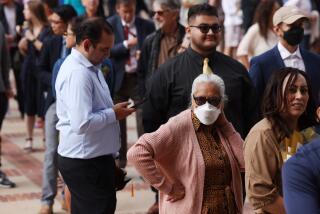Studies See Increasing Risks by Gay Men
- Share via
Gay and bisexual men in the Los Angeles area are engaging in risky sex--often with multiple partners in public places--even when they know they have tested positive for the AIDS virus, scientists reported at a UCLA conference Friday.
“The data is alarming because it suggests that there could be a resurgence of AIDS in high-risk populations,” said Dr. George Lemp, director of the Universitywide AIDS Research Program of the University of California.
Indeed, HIV infections already are disturbingly high among young gay and bisexual men in Los Angeles and other major cities, according to research recently released by the Centers for Disease Control and Prevention. In Los Angeles and five other cities, one in 10 young gay or bisexual men is infected, according to the findings. Among African Americans, the figure is far higher: nearly three in 10.
Scientists at the conference, the 18th annual Universitywide AIDS Research Program were particularly worried by three local studies.
One, conducted by the Los Angeles County Health Services Department, interviewed 53 HIV-positive gay and bisexual men over a one-year period.
Researchers found that half the men, despite their HIV status, had sex in public places such as bathhouses or clubs with multiple partners without informing their partners of their status. Some did not use condoms.
Another study, also conducted over two years by the county health department, showed that a group of 305 black men who identified themselves as heterosexual but engaged in anal sex with men did not use condoms 61% of the time. By comparison, those who identified themselves as gay or bisexual didn’t use condoms 44% of the time.
And an AIDS Project Los Angeles survey showed that 31% of 113 bisexual men interviewed continued to engage in risky sexual behavior, even after being informed of their HIV-positive status.
Though the three studies focused on relatively small populations, other surveys nationwide have shown similar declines in safe sex practices. Many researchers say fatigue with such practices and overconfidence in newer, more effective anti-AIDS drugs are to blame.
At Friday’s conference, researchers said that instead of focusing on medicines, clinics and counselors need to coordinate their efforts to discourage unsafe sex by treating “the whole person.”
“We hand out condoms and give them pamphlets and that’s about all the time we have,” said Dr. Ronald Mitsuyasu, a professor of medicine at UCLA. “A lot of what we see in these studies points to the need for counseling young people who have just come out.”
Scientists pointed out that the studies did not give a complete picture of the Los Angeles AIDS situation and called for further research.
“Even though we only had a small number of participants, this says we need bigger studies and we need them quick,” said Kwa Sey, an epidemiologist with UCLA.







